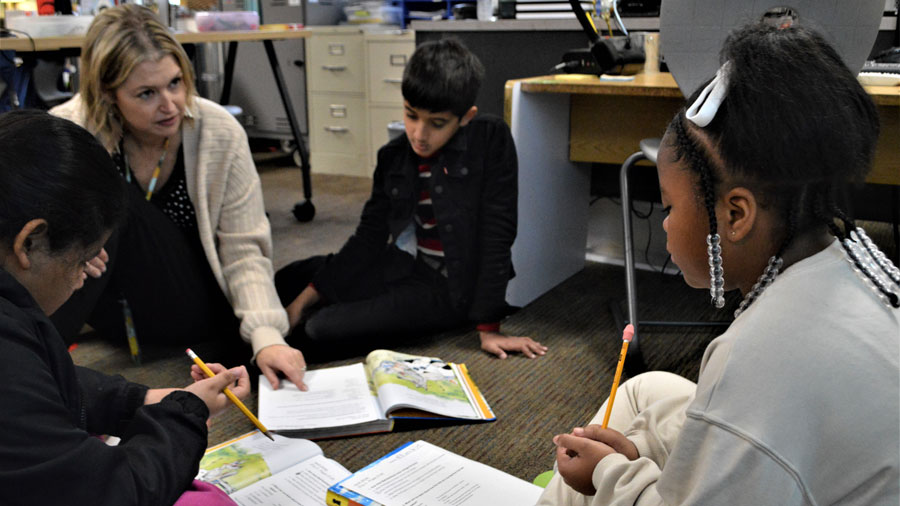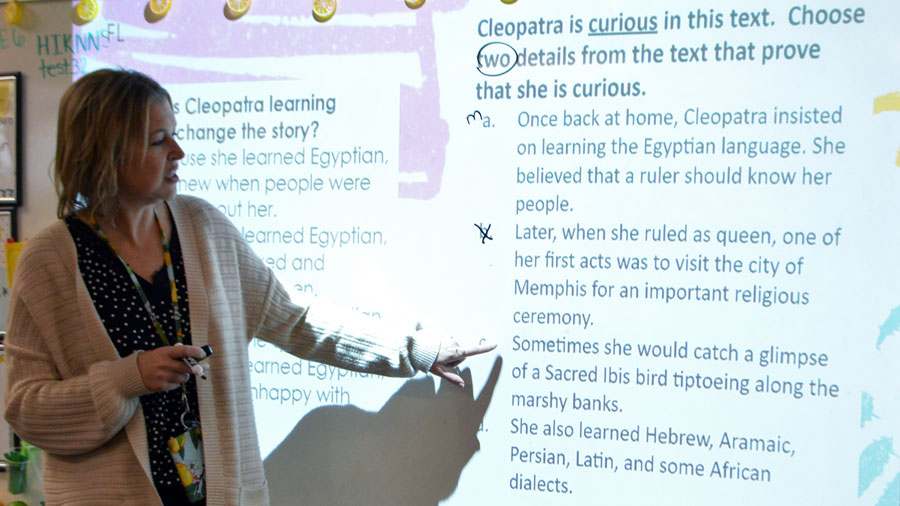Kentwood — While reading a story during an English Language Arts lesson, Challenger Elementary third-graders pondered how the character Wolf was feeling when he gathered with his animal friends.
“I think Wolf feels content,” said Brandon Kilbrel, trying out a word he had just learned, his pencil on the text in front of him. “I think he was content because in this paragraph it says, ‘Wolf stretches in the grass and he was happy to have such wonderful friends.’”
“Now, Cow,” he said to Rachel Sui, who sat next to him on the classroom carpet. “I think Cow was excited, because after Wolf read the story he was very happy and he said, ‘We should all become storytellers.’”
Fellow classmate Mohammad Khan sounded pretty excited himself as he repeated Cow’s words: “We should all be storytellers! That is excited!”
These third-graders were immersed in the lesson tied to an ELA standard in teacher Heather Cobb’s class. She read a story about Cleopatra, challenging students to recognize how the Egyptian queen showed she was “curious” through her actions. Students then began their own work in small groups, identifying character traits like frightened, determined and responsible in the Wolf story.
For both parts of the lesson, students discussed multiple-choice and fill-in-the blank answers with each other.
“They are having to really be critical about the answer choices they are given,” Cobb said, explaining how the development of critical thinking skills prepares students for tests like M-STEP.
Cobb and other educators attribute students’ success to consistent and focused instruction, such as going step by step to master a standard.
Educators also cite it as a reason Challenger students have achieved levels of proficiency that earned them the 2022 Building the Hope Schools award from Education Trust Midwest, an education policy, research and advocacy organization. The award honors schools that consistently demonstrate exceptional progress for traditionally underserved students.

On Top in Several Categories
The 370-student, K-5 school is in the top 25% of Michigan schools for academic proficiency or above-average student growth, according to analyses by researchers from Education Trust Midwest. Challenger’s subgroups of students — Black, Latino, low-income and English-language learners — performed in the top 30% among Michigan’s high-growth public schools, according to M-STEP data in math and reading from the 2016-17, 2017-18 and 2018-19 school years.
At Challenger, 81% of students are economically disadvantaged, 47% of students are Black, 16% are Hispanic and 23% are English-language learners.
‘Without relationships, it’s hard to have such rigorous academic standards. Our biggest thing has been high expectations – making sure every kid has access to grade-level standards.’
– Kris Meister, Challenger Elementary instructional coach
Kentwood students’ 2022 proficiency in general was down from pre-pandemic levels, as is the case for most of the nation. However, Challenger students have continued to outperform their peers in some areas. For example, 71.4% of fifth-graders were proficient in ELA on the 2022 M-STEP, well above the Kent ISD average of 50.9% and the state average of 43.1%.
“The foundations we had (in place) allowed us not to take a major hit during the pandemic,” said Principal Teressa Gatza.
Challenger is one of only five schools in the state to receive the award this year. Analysts and team members visited schools and conducted interviews to get a firsthand look at the schools’ learning environments as part of the selection process, Gatza said.
“The cool thing about the award is they contacted us a couple years ago … and said, ‘We’ve noticed your data in a couple subgroups were exceptional and we want to look further at your school,’” Gatza said. “They recognized that Challenger had potential to earn that recognition.”
Added instructional coach Kris Meister, “We were able to reflect on our journey here at Challenger over the past four or five years and really think about what we’ve been doing that has led to that success for all kids.”

A Belief in All Students
Culture and relationships are top reasons for students’ success, Gatza said: “It’s the mindset and belief that we can reach any kid and accomplish high expectations. It’s universal here.”
That belief, combined with consistency, is key, Meister said. Teachers show they care, they value student voice and they consider what is going on in students’ lives outside of school. Teachers also have lots of collaboration time and participate in learning labs to observe and learn in each other’s classrooms.
The educators also studied findings in The Opportunity Myth, which details how many students enter college unprepared for its rigor because they have not been exposed to high expectations, strong instruction or high levels of engagement.
“Without relationships, it’s hard to have such rigorous academic standards,” Meister said. “Our biggest thing has been high expectations — making sure every kid has access to grade-level standards.”
Cobb explains her school’s success succinctly: “Everyone is valued here.”
And back in Cobb’s class, third-grader Christopher Jordan was thinking about what he learned from reading about Wolf and Cow.
“I learned to be determined and never give up and always try your best. I learned today that ‘determined’ means to never give up.”












